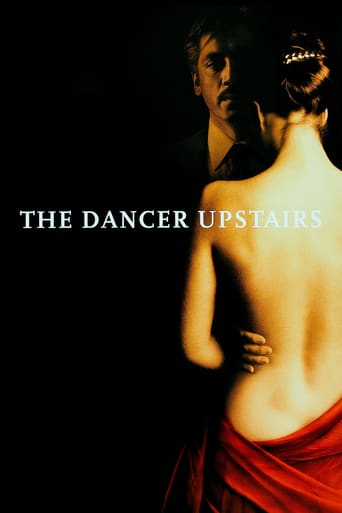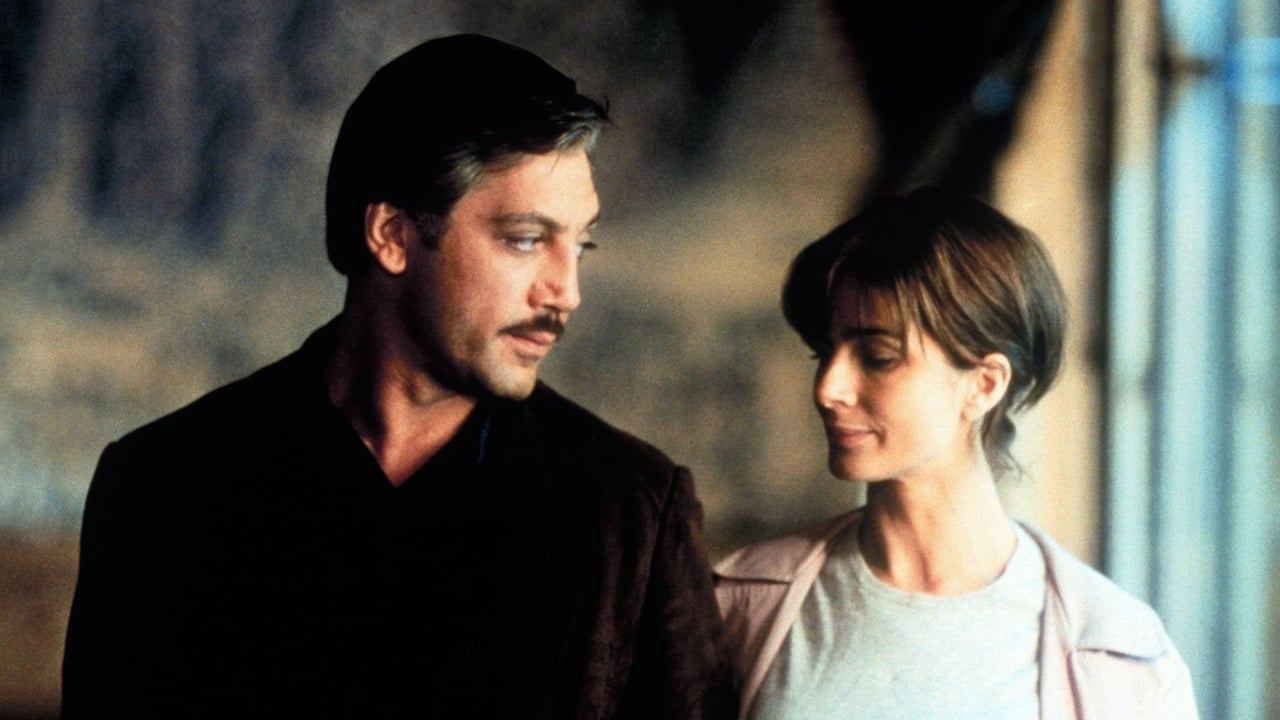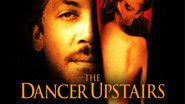johnnyboyz
Crime thrillers set amidst repression and political turmoil with the potential to be in the Spanish language are not the first things that come to mind when we think of the contributions to cinema by that of a certain John Malkovich. It is a credit, then, that he has created something in The Dancer Upstairs that feels like it might have come from Latin America; that feels like it may have been made by someone with an adept knowledge of things such as oppression in these places, even as a film made by someone who may indeed have lived through such periods. Malkovich is, of course, first and foremost an American actor, but he demonstrates he's more than capable of capturing on screen what oppression and anxiety bathed in a colonial Spanish nation might look and feel like in this 2003 film.The film isn't necessarily set anywhere in particular: this is a "capital city" in an unspecified Latin American country whose flag bears both the colour scheme and the potential for insignia akin to Guatemala's, although further reading reveals it's based on a chain of events that happened in Peru in the 1990's and the film itself was shot in Portugal. We kick off in the desert, several years before the main body of the film takes place: a jeep full of young political renegades crash through a small checkpoint, getting away with ruthlessly running over the lone guard. Then they reach the checkpoint run by Javier Bardem's character, a middle aged man who gave up a career in law to join these services. He is Agustin Rejas, and he is kind; talkative and understanding where those wanting to pass through are sinister and without emotion. One of those in the car needs their photo taken to advance, something they are reluctant to do but Rejas talks them through it with the minimum of fuss as if it were a child about to sit in the dentist's chair. One reviewer already pointed out how fresh this scene feels, if purely from a standpoint that generic roles have been subverted: the suited guards at the checkpoint are calm and understanding, whereas those wanting to pass through look like they just want to see your blood on the wall.Years later, Rejas is a police detective with a young assistant in this same, anonymous Latin American country. The problems in life have escalated from correcting passports to finding those whom to some are freedom fighters, but to others (including Rejas' superiors) are dangerous terrorists: a man calling himself "Ezequiel", whose forte against the state is to apply the usual threat of explosives on top of hanging the carcasses of dead animals from street lamps for the grim spectacle of it all. No one knows who he is, and the police are wide eyed and dumbfounded in attaining any sort of lead. It is Rejas' job to take him down, the safety of his young daughter and wife Sylvina (Lencastre) essentially at stake in that if this ghost-like individual sees all and knows all, then how long will it be until what matters most to our Rejas is threatened?The film is a binary depiction of this man's world in both a personal and professional sense, the sort of well-made drama you wish more people had heard of and consequently seen; the covering of someone going to great lengths to uncover the identity of this terrorist as well as deal with the ever growing feeling he has for a certain Yolanda (Morante), a ballet teacher who is educating his daughter in the art of such a thing. The strand revolving around these two is neatly attributed its own weight away from the central tract, moreover we observe Bardem's existing wife come off as a bit shallow; an image obsessed individual whom we don't especially like all that much. Where Yolanda's profession is performance, Rejas' is investigation and the dance studio acts as a fitting locale wherein the ballet apparel accentuating her figure and a bombardment of mirrors dotted around do well to hook Rejas in as much as they do allude to a man reflecting on his own marital status during which he ponders his love for this woman.The film plays like an old private eye movie, wherein the lead is looking for someone dangerous or wholly specific; has to deal with a love interest and is forced, on occasion, into cooperating with those on his own side that are not entirely helpful. Recall the opening act of Die Hard: With a Vengeance, the second sequel to McTiernan's own 1988 original, and try to re-imagine all that scooting around and puzzle solving under a cloud of potentially lethal terrorist activity without the slam-bang approach; replaced instead with something more methodical and more burning. Try re-imaging it with its lead spending the next few scenes after having had to fire a gun still shaken from the experience; picture the film stretched out to a longer running time and you have something that resembles The Dancer Upstairs, a really engaging and well made drama.
RResende
For the way they move my soul, i think films fall into 3 categories: -those that make me indifferent, unable to push any of the buttons that stimulate my mind and emotions, the worst kind; -others just punch you in the stomach, they just shock you, force you to face situations without making you really dig into its core; -the best kind of film move everything inside you, make you discover parts of your soul you didn't know to be there. They grab you where it matters, and lead you to uncharted territories;I would never guess that this film would fall into the third category. But it does, despite its flaws, which are not few. For his work as an actor i always thought Malkovich was an interesting person. There is a kind of disturbed lucidity that overshadows even his loudest commercially oriented interpretations. Also, if you check is role choices, he is one of those guys who gets into crap projects to make a living, and than finds time to work in things that motivate him. That's why we have 3 participations in Oliveira's films. Here he tried directing.On the surface, the story is a bad choice. How and what happens is uninteresting, predictable and even incoherent. But there is something great: we are led into thinking we will watch a political thriller, high conspiracies that affect the lives of small people. The lonely hero who will do the right thing. Having not read the book, i'm guessing it points that way. The beginning of the film gives that impression as well. But than Malkovich deceives us, and smoothly pushes us into a deeper layer of personal emotions, of character development through people's relations. In the end, this is a story about an interesting character caught up in a corrupt shallow world, who makes his way into trying to live an honest life, "looking for a more honest way to practice the law". A little bit like Malkovich's career. We have that character beautifully played by a highly focused Bardem, a very interesting method actor. His character lives polarized by three women, his empty headed wife, his dance oriented daughter, and her troubled dance teacher. How he swings among them is what matters. For how the political background intersects Bardem's emotional life, i think the story helps, but i found it a major flaw that Malkovich wasn't able to make us understand when we should really give up on the (after all) useless thriller and focus on what he sure wanted to do, which was to center us on the head of Bardem's character. I know Malkovich wanted it better, but hey, this was only his first try.The direction is uneven. We have some poorly edited dialogs which work against the actors and the fluidity of the story, and some bad choices in the scene sequences that perturb the understanding of the plot. Basic mistakes. Worse than that, some times Malkovich looses the grip and let's us, spectators, wandering about where to go next. This tense and concentrated film requires a gripping direction which Malkovich doesn't deliver consistently. But we also have pieces of honest pure and beautiful cinema, which include performances. Among these we have a dancing lesson, inter cut with the murder of three people in a theater performance, having the audience take those executions as a part of that performance. And we have the very final scene, a performance of the child, with Bardem rushing to get there. Those and other bits were truly powerful, sincere and moving. Should we have this consistency through all the film, and we'd have something really powerful.There is something particularly well done: the locations. Malkovich is known to be around Portugal often, so i imagine he chose personally most of the locations. Anyway, they always add to what he tends, they are a permanent character that en forms what we are supposed to see. In this specific point, the film is consistent all the way. I'm guessing a lot of time was put into choosing the places.My opinion: 4/5 there is a true soul behind this, despite its flaws as a film.http://www.7eyes.wordpress.com
Philip Van der Veken
Having seen "Being John Malkovich" recently, I expected a lot from "The Dancer Upstairs" and I have to admit that I really was enchanted by it. Even though it never says which country in South America this story is based on, it's clear that it must be Peru. There just are too many references to the rebel movement The Shining Path, president Fujimori... But it's good that it never says that it is actually Peru. There are more South American dictatorships, more rebel movements...It tells the story of an ex-lawyer who has become police officer, because he wanted justice to be done in the right way. He has to hunt down and arrest a revolutionary guerilla leader, but as he digs deeper, he'll find out that more people are actually supporting the rebels than he thought, even the people that he never suspected...What I liked so much about the movie is the way it portrays everything. It doesn't fear to show the violence committed by both sides, but also shows the beautiful side of the country (its landscapes, its culture,...). Some say this is clearly a right-wing movie and that Malkovich is right wing as well. What has the political preference of the director to do with it? This movie isn't right-wing, nor is it left-wing. It clearly shows both sides, giving you the police detective who works for the right-wing government, who falls in love with the left-wing activist.If there is one remark that I have to make, than it must be the fact that the actors didn't speak in Spanish. Now they had some weird Spanish-English accent. But all the rest was really very good. I give it an 8.5/10.
Joker-26
(SOME SPOILERS AHEAD)Even though I realize that he is very right-wing, I still found this film intriguing. It took me a while to realize it was indeed the Shining Path movement that this was loosely based on. Even the leader of this movement looks a bit like Guzman. I have to say the settings were beautiful (filmed in Ecuador and Spain apparently). The opening scene where the lead detective meets his future nemesis was well constructed, and it instantly imbued the revolutionary leader with a mysterious edge when he talks of 'this country gives me a rash', which the policeman responds to with 'the countryside?' and the man replies with 'yes, that too'. As others have pointed out, there was a clichéd element to it (and the English speaking Spanish actors could have been speaking Spanish, but we all know how American producers and studios as well as cinema goers hate 'foreign movies with subtitles'!!!)....however, it is still original work as we get an insight into the bizarre displays of terrorism by this group (hanging dogs, child bombers, etc) and of course the panicky, paranoid response of the government and military who always demand to know 'are we in a revolution?'. The sub-plot of the relationship between the detective and the ballet dancer is a bit predictable and unnecessary I thought. Of course there is passion and love during political turmoil but this was over-the-top. Also, you're given the sense that the people involved in this group are all brainwashed automatons who 'fell prey to the charismatic leader', which is not true of the vast majority of rebel movements. The Shining Path had some legitimate grievances against state repression but unfortunately Malko ultimately portrays them as irrational murderers (with the suicide bombings into cafes, etc which plays to his rather violent and irrational pro-Israeli views on 'terrorism') Overall though, a stylish and watchable film, though tinged with some right wing propaganda that comes out during the middle and towards the end of the film. Homosexual reactionaries will enjoy it immensely as good looking male cops battle the evidently feminine world of the revolutionary movement.



 AD
AD




